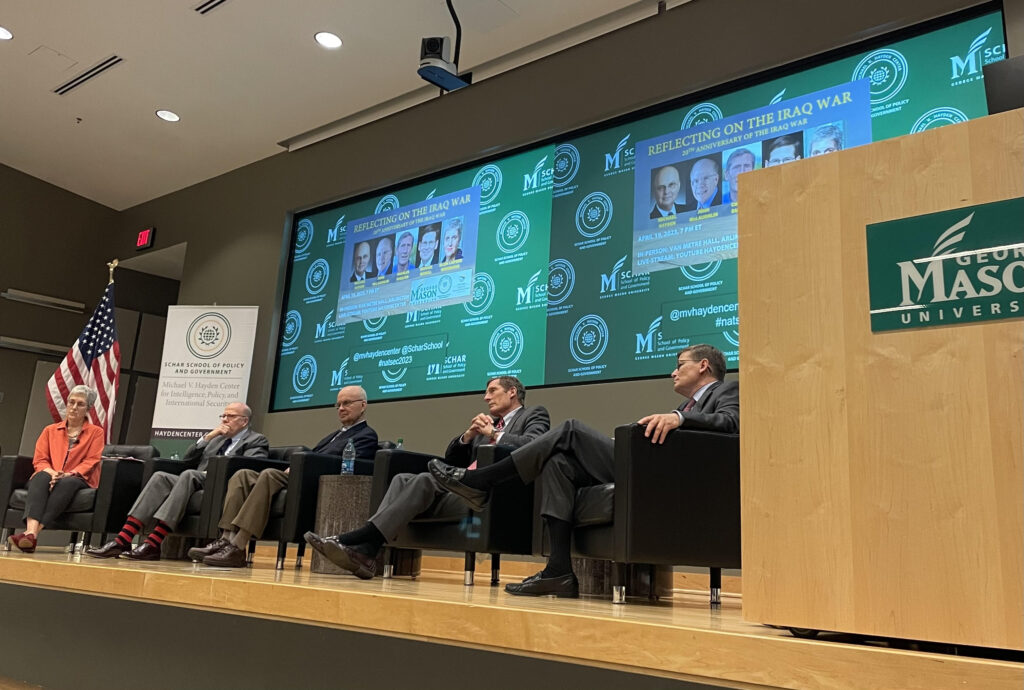Kayleigh Megan Turk
On April 19th, 2023, the Michael V. Hayden Center for Intelligence, Policy, and International Security at George Mason University’s Schar School of Policy and Government held a panel discussion, Reflecting on the Iraq War, to discuss the dynamic between policymakers and the Intelligence Community (IC), in recognition of the 20th anniversary of the 2003 U.S. invasion of Iraq. The panel featured: John McLaughlin, former Deputy Director of Central Intelligence (DDCI) and later Acting Director of Central Intelligence (A/DCI), currently a professor at the John Hopkins University School of Advanced International Studies; General Michael Hayden, former Director of the National Security Agency (NSA) and the Central Intelligence Agency (CIA), and founder of the Hayden Center; Charles Duelfer, former Special Advisor to the Director of Central Intelligence on Iraqi Weapons of Mass Destruction (WMD), and former leader of the Iraq Study Group; and Michael Morell, former Deputy Director as well as twice Acting Director of the CIA, and Hayden Center senior fellow. Moderating the event was Ellen Laipson, former Vice Chairman of the National Intelligence Council, former president of the Stimson Center, and current Director of the International Security Master’s Program at the Schar School.
The panel started by discussing the mistakes made by the Intelligence Community, how they were made, and the lessons learned moving forward–the main mistakes being the U.S. getting WMD wrong, failing on collection, and failing on intelligence analysis. Mr. McLaughlin and Mr. Duelfer discussed Iraq as a “hard target” for the U.S, being a place where the U.S. does not have much access, where deception is involved, where people are trained to resist recruitment by intelligence officers, and where they are very skillful in eluding the type of collection techniques used. Mr. Duelfer emphasized that limited data contributed to the general bias that “Suddam would be crazy not to have WMDs.” Mr. Duelfer further noted, “There was a risk of a negative feedback loop, in terms of how close the Iraq regime was to telling the truth and our propensity to believe it.”
On the topic of limited data, Mr. Morell noted, “Analysts came to the logical conclusion based on the information that was sitting in front of them—the mistake they made was concluding in the National Intelligence Estimate that they had high confidence that chemical and biological weapons were present and that Iraq was reconstituting their nuclear weapons program.” Mr. Duelfer suggested that after 9/11, risk tolerance was very low; many were convinced there would be a second attack at any second, which could have shaped policymakers’ thinking toward Iraq. Mr. Morell noted that senior officials at the Defense Department made multiple arguments for why we needed to go to war, and the intelligence on WMD was only one of those.
This discussion shifted into a conversation on covert action, in which Mr. Morell noted that “covert action often comes at a significant cost.” With Iraq, personnel were allocated to prioritize covert actions, which was one factor in why there was a lack of collections. General Hayden emphasized how crucial it is for analysts to express confidence levels when reporting analytic findings and answering policymakers’ questions. Mr. Morell added to this point, noting to “give as much thought to your confidence level as you do to your [analytic] judgment.”
During the discussion’s Q&A portion, an audience member questioned whether there were any successes from this war. Mr. McLaughlin noted that “much of what occurred successfully after this failure resulted from the changes we made in response to this failure.” In response to a question about accountability, Mr. Morell noted that many studies have been done on the failures of intelligence throughout this war, but he has yet to see a study done on the failures of the policy side. Finally, in response to the question of how accountability is addressed in intelligence, Mr. McLaughlin noted, “Accountability is easy when it’s a matter of maleficence, it’s harder when it’s an analyst working under time pressure, dealing with incomplete information, deception, is doing their best, and then gets something wrong; it’s harder to hold them accountable.” Mr. McLaughlin continued, “When we get something wrong, we’ll oblige someone to make an effort to teach others how not to do that.” Mr. Morell added, “Analysts take risks when they make judgments, having 10 percent of what they need to fully understand an issue, and if you hold people personally accountable, no more risk-taking.”
Despite the failures of intelligence analysis surrounding weapons of mass destruction, the Intelligence Community was able to sufficiently analyze and predict several other Iraqi matters, such as the lack of a connection between the government of Saddam Hussein and the al-Qa’ida terrorist group and particularly the concern for the stability of the Iraqi government following de-Ba’athification. The panel commented that looking back, it is probable that the U.S. would have gone to war regardless of the IC’s input. The DoD and U.S. policymakers were driven by “the combination of both fear and the desire to reassert American primacy” and by the early success of Afghanistan.
The panel invited a special guest in the audience, Samir Samaida’ie, the former Ambassador of Iraq to the United States, to share his thoughts on the Iraq war. First, Ambassador Samaida’ie summarized how the communication chain between policymakers and intelligence is “full of gaps, full of pitfalls.” In addition, Ambassador Samaida’ie commented on the chaos created by “the tribal warfare” between the different agencies and how these gaps in the American government explain the disorder found in the Iraq operation. Finally, he noted that many Iraqis and outsiders do not understand these gaps, and some may be unaware they existed.
A full recording of this event can be found on the Hayden Center’s YouTube channel at https://youtu.be/WLNCu3DEHKM.

